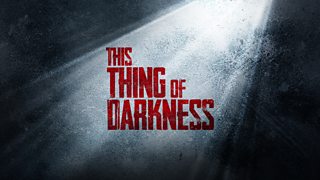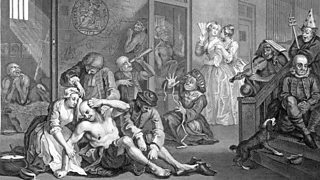What makes a murderer?
Murderers don’t scare Dr Gwen Adshead. If anything, they interest her. In over 25 years as a forensic psychiatrist working in prisons and psychiatric hospitals, she has assisted the process of justice time and time again by helping courts understand who violent offenders are as people, and why they do the things they do. In this time, Gwen has also trained as a therapist, specialising in group therapy with violent offenders.
As a consultant, she recently lent her expertise to the gripping new drama This Thing of Darkness, which explores the psychological impact of murder on both a victim’s family and on killers themselves. Gwen may help offenders to discover more about themselves, but she’s learned a lot from them too. Here, she shares some surprising insights into the minds of murderers.
-
![]()
Listen to Part 1 of This Thing of Darkness
A gripping drama exploring the psychological impact of murder on a victim's family and on the killer.
Violence is less common than you'd think
One of the most important things I’ve learned over the years is that ‘violence’ is not just one thing; not all violence is the same and not all violence has the same meaning. For some offenders, violence is just a way of getting what you want. A common example is when people use guns in an armed robbery to make sure that the victims give up their money. Such offenders are not generally violent except when they need to be (in their view). There are other people who are only violent in highly emotional situations involving people they are close to; such as battering men or people who physically abuse their children. The violence is intended to communicate a message to the victim; usually ‘look what you made me feel’.
Understanding and explaining violence is not the same as excusing it in any way.Dr Gwen Adshead
Understanding and explaining violence is not the same as excusing it in any way; but if we can understand why it happens, then we are in a better position to prevent it and intervene with offenders. Importantly, I’ve learned that violence is actually quite an unusual way of breaking the criminal law. Theft or fraud or some variation on that accounts for about 70% of all crime. Of course we are rightly concerned about all acts of violence; but violence is comparatively rare in the UK.
How to gain the trust of a violent offender
One thing that is common in violence perpetrators is a history of adverse childhood experiences; including child abuse, bereavement, parental substance misuse and exposure to domestic violence. In a recent study of male prisoners, 80% had experienced one kind of childhood trauma or adversity; and nearly 50% had experienced four or more kinds of childhood trauma.
The main implication for my work is that many of the prisoners/offenders I meet are wary of adults; and it takes a long time to build up trust, much longer than in the general community. What I find works best is to accept that there may be good reasons why the people I meet are mistrustful; and not to expect easy or quick results. In fact, if prisoners or patients actually agree to see me at all then they are usually willing to give therapy a go, even if it’s hard.
Committing murder can traumatise the perpetrator as well
Like many people I used to think of murderers as a group of people who were completely different from anyone else; and in some sense they are. Killing another person does change your life in many ways; not least because most people who kill lose their ordinary liberties for a long time and have to develop a new identity as someone who killed; a kind of sticky identity.
Again, it may surprise people to know that murder is an unusual offence; and can be committed by people who are not overtly mentally ill or previously criminal. By talking to people who have killed I have learned that murder is no ordinary event; and that not all murderers are the same.
Killing someone you love can be a highly traumatic experience for the perpetrator; with similar ‘symptoms’ to those who suffer PTSD.
I have also learned that killing someone you love can be a highly traumatic experience for the perpetrator; with similar ‘symptoms’ to those who suffer PTSD in wartime or after being a victim of violence. The point here is that the perpetrator often kills in a chaotically hateful state of mind which then dissipates, leaving distress and despair behind. Rates of suicide are high for people who kill; especially those who kill loved ones.
Rehabilitation is possible
I firmly believe that rehabilitation is possible for most violence perpetrators, if they have the proper support and interventions to help them think. Reducing and managing future risk is possible for many offenders; especially if we can help them to abstain from using drugs and alcohol and if we can support them with literacy, employment and housing. All these factors are vital in managing future risk and promoting good lives in the future. There are people who do not want to be rehabilitated; and for those people, there is little that can be done. They can appear as lost souls, who may need to be contained for the rest of their lives.
Therapists need therapy too
Like most therapists, I’ve had a lot of therapy myself; which has been good for my mental health and also been essential for making sense of the painful things I hear. Overall I generally feel that it is a privilege to do this kind of work; to be close to the heart of the kind of tragedies that seem uniquely human.
-
![]()
Welcome to This Thing of Darkness
Welcome to this gripping new podcast from ���˿��� Radio 4.
-
![]()
The Life Scientific: Gwen Adshead on treating the minds of violent offenders
Forensic psychotherapist, Gwen Adshead, tells Jim Al-Khalili how she helps violent offenders detained in prisons and NHS hospitals, like Broadmoor, to change their minds.
-
![]()
In Our Time: Bedlam
Melvyn Bragg and guests discuss the early years of Europe's oldest psychiatric hospital, St Mary of Bethlehem, which soon became known as Bedlam.
-
![]()
Desert Island Discs: Dr Gwen Adshead
Kirsty Young's castaway is Dr Gwen Adshead, consultant forensic psychotherapist at Broadmoor Hospital.




